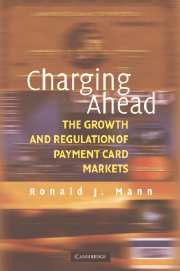Book contents
- Frontmatter
- Contents
- Figures and Tables
- Acknowledgments
- Introduction
- PART I THE BASICS OF PAYMENT CARDS
- PART II EASY MONEY
- 3 In Defense of Credit Cards
- 4 The Psychology of Card Payments: Card Spending and Consumer Debt
- 5 Over the Brink: Credit Card Debt and Bankruptcy
- PART III THE PUZZLE OF PAYMENT CARDS
- PART IV REFORMING PAYMENT SYSTEMS
- PART V OPTIMIZING CONSUMER CREDIT MARKETS AND BANKRUPTCY POLICY
- Conclusion
- Appendix: Country-Level Data
- Notes
- Bibliography
- Index
4 - The Psychology of Card Payments: Card Spending and Consumer Debt
Published online by Cambridge University Press: 06 July 2010
- Frontmatter
- Contents
- Figures and Tables
- Acknowledgments
- Introduction
- PART I THE BASICS OF PAYMENT CARDS
- PART II EASY MONEY
- 3 In Defense of Credit Cards
- 4 The Psychology of Card Payments: Card Spending and Consumer Debt
- 5 Over the Brink: Credit Card Debt and Bankruptcy
- PART III THE PUZZLE OF PAYMENT CARDS
- PART IV REFORMING PAYMENT SYSTEMS
- PART V OPTIMIZING CONSUMER CREDIT MARKETS AND BANKRUPTCY POLICY
- Conclusion
- Appendix: Country-Level Data
- Notes
- Bibliography
- Index
Summary
The problem with credit cards is that they are not just easy to use, but too easy. The idea that credit card debt might contribute to a broad increase in financial distress in an economy is not a new one. Diane Ellis at the FDIC first brought the idea to mainstream attention almost a decade ago in a 1998 paper noting some straightforward correlations between credit card debt and consumer bankruptcy filings in the United States.
Although that idea has a commonsense appeal, it has not gained a great deal of attention from policymakers. It is not difficult to articulate public-choice explanations for the failure of policymakers to take the problem seriously. It would be easy enough to claim that policymakers have been unduly attentive to the interests of the credit card issuers who have focused so much attention on control of the federal legislative process. In truth, however, the existing literature has not examined the relation between credit card use and financial distress with the rigor that would justify taking seriously any claimed connection between the two. This chapter and Chapter 5 take up that question in two parts. First, this chapter considers the relation between plastic card use and overall consumer borrowing. Then, Chapter 5 closes this part of the book by considering the relation between credit card use and consumer bankruptcy.
- Type
- Chapter
- Information
- Charging AheadThe Growth and Regulation of Payment Card Markets around the World, pp. 45 - 59Publisher: Cambridge University PressPrint publication year: 2006

